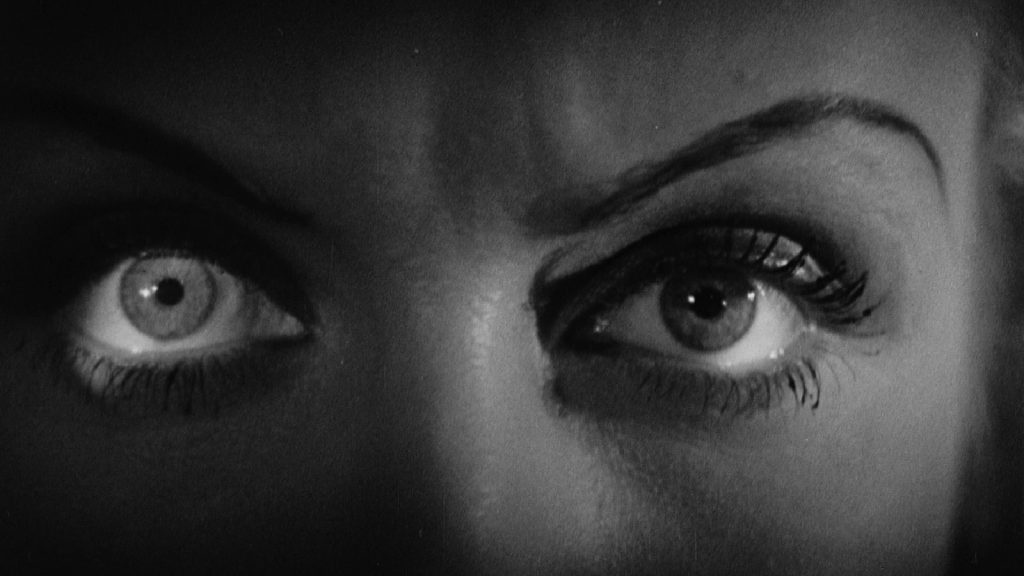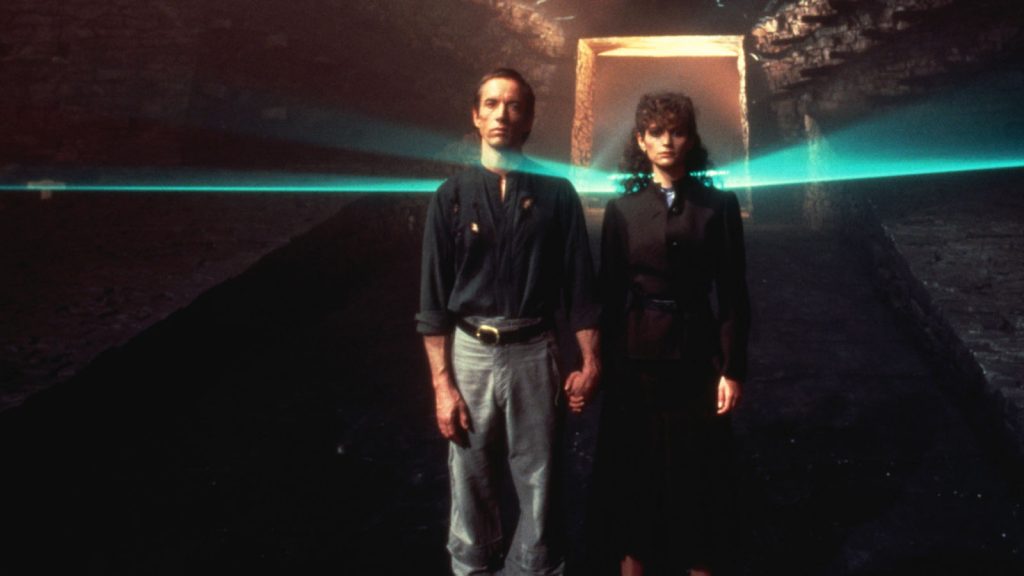
Before we assess the villain, let’s begin with the hero—and “hero” is the correct appellation for Johnny Smith, most especially because where he begins in this story is so touchingly ordinary. Johnny is a humble grade-school English teacher with a nerdy haircut living in the mythical town of Castle Rock, Maine. He recites Poe from memory and speaks to his class in peculiar cadences, with emphases and pauses that seem always to allude to some obscure joke. Which is to say, he speaks like Christopher Walken, who has a singular way of puncturing line readings with disarming earnestness, delivering phrasings that would sound like affectation from any other actor. Johnny is in love with Sarah, embodied by Brooke Adams with the perfect balance of sweetness and desire. One day, Johnny surprises Sarah with an afternoon visit to a county fair. It’s there that he suffers a mysterious cerebral episode on the roller coaster: an augur of things to come.
When later that same day Johnny drops Sarah at home, she invites him in to spend the night, but he gently declines. Johnny plans to marry Sarah. “Some things are worth waiting for,” he tells her. He doesn’t know he’s going to wait half a decade. Minutes after leaving Sarah’s house, Johnny gets into a terrible collision on a dark, foggy road: he’s so wholesome that his car smashes into a truck full of milk. The accident throws Johnny into a coma, and when he finally wakes from it five years later, Sarah has long since given up hope, married another man, and had a child. The Dead Zone is, in its creepiness, its sparingly deployed but visceral moments of violence, and its overwhelming air of entropy, very much a horror movie. In its infusion of psychic phenomena into an otherwise realist scenario, it’s something of a science-fiction movie. But at this tragic juncture, we understand that the film is, above all, a heartbreaking adult melodrama: had he not been so virtuous that night, the accident would not have transpired, Johnny and Sarah would still be together, and Johnny may have evaded the strange fate that awaits him post-coma.

While convalescing, Johnny touches a nurse’s hand and is assailed by a vision of her house on fire. The nurse rushes home, and her house is indeed aflame, her young daughter narrowly rescued. Later, Johnny will touch a journalist’s hand and instantly gain knowledge of that journalist’s terrible private grief. He’ll touch the hand of his doctor, a Holocaust survivor, and instantly correct a presumption the doctor has held for 40 years. Johnny becomes a local sensation, blessed with a gift he regards as a curse: besides losing the love of his life, he’s also saddled with a weakened body, which seems to grow weaker with each new telepathic episode. Johnny’s like the titular character in Jorge Luis Borges’s Funes the Memorious, who’s thrown from a horse and is thereafter paralyzed, but gains the gift/curse of perfect memory, able to recall every detail that has ever crossed his perception. Both men emerge from mischance with debilitated bodies and fantastically enhanced minds, astonishing others while draining their lives of quotidian pleasures.
The source material for The Dead Zone is not, of course, Borges: part of what makes this film so special is that it’s the wildly unlikely pairing of Stephen King, a writer who never met a thing that goes bump in the night he didn’t like, and David Cronenberg, a filmmaker drawn to science fiction but without the slightest interest in the supernatural. Yet King’s novel prompted Cronenberg to adopt his most tonally focused storytelling style and embrace bold romantic gestures, while Cronenberg’s intelligence, economy, and fascination with the body infused the material with a gravitas exceedingly rare in King adaptations. The year 1983 saw the release of both Cronenberg’s most personal and, seemingly, most impersonal films, but while Videodrome synthesizes so many of the auteur’s most enduring thematic preoccupations, The Dead Zone exudes a heaviness and sense of fate that, 40 years on, has proven to be very Cronenbergian. (It’s also worth noting that post-coma Johnny assumes the wind-shocked hairstyle that will later become Cronenberg’s sartorial trademark.) The Dead Zone is a serious, eerily beautiful, ultimately very sad movie: just listen to its haunting, dread-laden score—Michael Kamen’s best—or consider its heart-wrenching ending, in which our hero, emboldened by a certainty only he possesses, opts for self-sacrifice as a means of preventing a potentially apocalyptic catastrophe only he can foresee. Which brings us to our villain.

As reports of Johnny’s visions spread, he’s enlisted by local police to help track down a serial killer, but the chilling resolution to this episode—which features superlative supporting performances from Tom Skerritt, Nicholas Campbell, and Colleen Dewhurst—doesn’t constitute The Dead Zone’s climax. Rather, Johnny’s story closes with an act of heroism no one but he will ever comprehend. Following the serial-killer episode, Johnny refuses further treatment from his doctor, moves to a town where no one knows him or his sensational story, and attempts to live a quiet life as a private tutor. Yet fate seems unwilling to leave Johnny be. The man Sarah married shows up at Johnny’s door, campaigning for senatorial candidate Greg Stillson (Martin Sheen), a shameless, back-slapping populist. Stillson dons a hard hat and does push-ups at his rallies. He decries the state of things not only in his potential constituency but also throughout the republic. The only solution to the myriad social problems Stillson diagnoses is, of course, Stillson himself.
Behind the scenes of his campaign, Stillson, aided, perhaps even directed, by his right-hand thug Sonny (the late, great Géza Kovács), uses any means necessary, blackmail included, to quash all dissent directed at him. Stillson is a fiercely ambitious, superficially charismatic, narcissistic monster, and, as King himself has stated publicly, portends a certain former U.S. president currently seeking to be reinstalled in that same office. Greg Stillson and Donald Trump are not exact mirrors of one another, but what matters is that the specifics of their broad appeal, along with their fundamental cynicism, are perfectly aligned. Sheen is a gifted actor, capable of imbuing his characters with texture and complexity, but what is essential to his performance here is, in a sense, its absolute lack of depth. There is this profoundly disquieting feeling whenever we see his eyes on screen: there’s nothing behind them. Nothing but pure psychopathy. In the final act of The Dead Zone, the cruelty of destiny brings Sarah back into Johnny’s life, but the benevolence of destiny brings Johnny into direct contact with Stillson. Johnny takes the aspiring senator’s hand and sees a future in which Stillson, having risen to the nation’s highest office, and having become intoxicated with the power bestowed on him, forces the U.S. into an act of aggression that could, in effect, inaugurate Armageddon. Johnny conceives of a plan to stop Stillson before he can begin his political ascent. It doesn’t work exactly as he planned it, but it works, leaving Johnny’s beloved Sarah forever haunted by his seemingly nonsensical actions and leaving Johnny with the bittersweet satisfaction of having done something undeniably good. Borges would have loved this ending.
Nearly every scene in The Dead Zone radiates a heightened, inexorable doom—until Johnny discovers that the terrifying future he envisions can be altered by actions taken in the present. While our present looks bleak and our leadership infuriates, dear American friends, an even more baleful scenario can be averted, not by an act of clairvoyant vigilantism, but by perfectly legal, democratic means. Please do the rest of the world a favor and exercise your right to alter the future this November 5. 🩸

is a freelance critic and playwright from Canada.
The opening image of David Cronenberg’s Crimes of the Future is arresting...
BY JOSÉ TEODORO | June 7, 2022
Sometimes all it takes is one sentence to demolish everything you thought you knew...
BY STEVEN MEARS | February 7, 2024
It’s an unfortunate fact of life: even super-smart women sometimes end up with terrible boyfriends. This, along with a very different tragic, universal reality—everyone’s body radically changes and deteriorates with illness...
BY VIOLET LUCCA | October 31, 2022

This pre-Code offering packs a lot of story into its typically brisk running time, with several plot threads weaving together a (not always successful) tapestry of spooky and criminal doings.
READ MORE >
BY ANN OLSSON | Month 00, 2021

In what could be the fastest-resulting rape revenge movie, a drunken lout brutally forces himself on Ida, the young woman who doesn't return his affections, during a party over Labor Day.
READ MORE >
BY LAURA KERN | Month 00, 2021

Beast is a lot of movies in one package - fractured fairy tale, belated-coming-of-age story, psychological drama, regional horror film - but above all it's a calling card for its leading lady, Jessie Buckley.
READ MORE >
BY LAURA KERN | Month 00, 2021